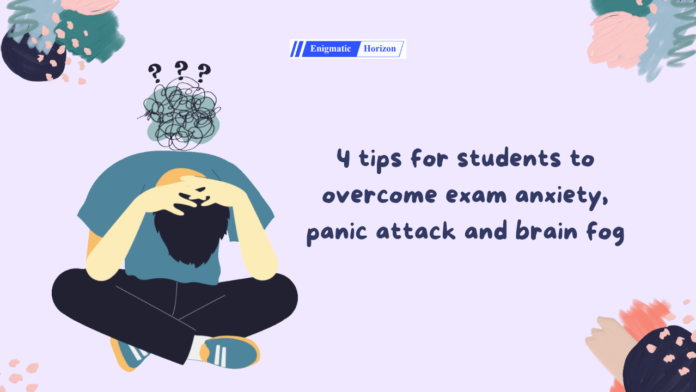Pooja Banga
You’ve done all of your preparation and studied hard. But then, just a day or two before the exam, you freeze up, feel extremely anxious, and even suffer a panic attack or brain fog such that you are unable to remember those answers you knew just last night. Well, this is nothing but a case of exam anxiety. Exam anxiety is a natural response for a student. It’s normal to feel tense and even freeze during exams. It’s a situation that a lot of people can relate to, since over 70% of students put off studying-related tasks. One may tend to feel anxious, have a sense of butterflies in the stomach, and even become physically ill. During the Coronavirus era, numerous adjustments and changes were imposed on students, which led to a lack of writing practice, which is now leading to increased levels of stress. In addition to the lack of writing practice, there is immense parental pressure to score well, which demotivates students even further.
If you are a student who is preparing for important examinations and suffering from feelings of fear, nervousness, and apprehension, follow these tips below to get rid of exam stress and anxiety and beat the blues.
Time flies fast, so prepare well in advance.
In an era of intense competition, where everybody is running for a better future, exam stress and anxiety can be real. While there are some students who pull all-nighters before their exams, there are some who tend to relax, wake up late, and waste precious time until the exam date looms closer and closer. First and foremost, students should remember that their success in life does not depend on a piece of paper. Therefore, it is important to avoid stress, but at the same time, it is beneficial to start preparing for an exam way ahead of time, as this increases the chances of success. Once you have read the entire page or chapter of your textbook, make notes and interpret everything in your own words. In the days between two examinations, don’t study or mug up new concepts, but finish revising what you have learned.
Eat your way to better health
Eating a healthy and balanced diet can do wonders for your mind and body. Right before your exams, consume a lot of nourishing foods like green vegetables and fruits to enjoy various health benefits and keep up with your exam preparations. Nuts are essential for brain health. Try consuming nuts and milk in between your study breaks to refresh your mind and increase your concentration. Also, keep junk food at bay, as it can drain your energy and slow you down. Most importantly, drink enough water to stay hydrated and maintain a good sleep schedule of 7-8 hours to relax and prepare your mind to avoid feeling dizzy during the exam.
Practice mindfulness and breathing techniques
Stressing over your exams can make you feel overwhelmed, anxious, and fatigued, which can lead to difficulty studying. After every 3-4 hours of study, allow your body to rest, relax, and unwind. During this time period, listen to good and calming music. After each break, gather your thoughts and notes in one place and review all that you have learned. You can also indulge in relaxation exercises like meditation, yoga and take long, deep breaths to decrease the stress response and think more clearly. Also, during the day of your exam, follow deep breathing techniques while slowly and gradually relaxing your muscles and shoulders to release the stress and do your best.
Seek support from friends, family and mental health professionals
Sometimes the pressure you feel during exams can help keep you focused. Sometimes, it can interfere with your mental health and reduce your working memory. If you’re experiencing exam stress, do not hesitate to reach out to a friend or family member who listens deeply and compassionately. Without thinking of how they’ll respond, put all your fears on the table, as this can make you feel heard, light at heart, and motivate you at the end of the day. While a little nervousness before an exam is normal, panic attacks can be serious and require urgent medical attention. If you often have panic attacks the night before an exam or while studying, talk to a mental health professional about your symptoms so you can get back in charge of your thoughts.
